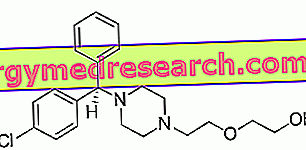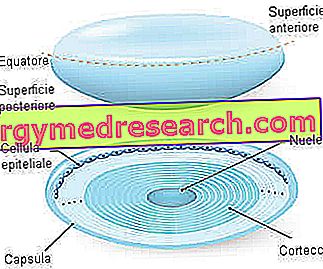Hydroxyzine is a first-generation antihistamine drug with anxiolytic activity. It is marketed under the name of Atarax®.

Hydroxyzine - Chemical Structure
Indications
For what it uses
Hydroxyzine - administered orally - is indicated for:
- Treatment of allergic dermatitis accompanied by itching;
- Short-term treatment of anxiety states.
When administered intramuscularly, hydroxyzine is indicated for:
- Urgent treatment of states of excitement;
- Preparation for surgery;
- Treatment of post-operative nausea and vomiting;
- Adjuvant treatment of systemic allergies;
- Treatment of general reactions from transfusions or medicaments.
Warnings
Caution should be exercised when administering the drug to patients with a predisposition to convulsive attacks or cardiac arrhythmias.
Children treated with hydroxyzine more easily develop undesirable effects on the central nervous system than adults. Furthermore, in children, there is an increased risk of seizures.
Hydroxyzine also has anticholinergic properties, therefore, it must be used very carefully in patients with:
- Glaucoma;
- Prostatic hypertrophy;
- Bladder neck obstruction;
- Stenosis;
- Gastrointestinal hypomotility;
- Myasthenia gravis;
- Cardiovascular disorders;
- Hypothyroidism;
- Dementia.
Alcohol intake during hydroxyzine therapy should be avoided.
Hydroxyzine therapy should be discontinued at least five days before performing allergy tests.
Hydroxyzine may cause effects that may affect the ability to drive or use machines, therefore, caution should be used.
Interactions
Concomitant administration of hydroxyzine and monoamine oxidase inhibitors ( MAOIs, drugs used in the therapy of depression and Parkinson's disease) should be avoided.
The action of hydroxyzine can be increased by the simultaneous administration of other drugs capable of depressing the central nervous system or of anticholinergic drugs.
Hydroxyzine antagonizes the effect of acetylcholinesterase inhibitors (the enzyme that metabolizes acetylcholine) and betahistine (a drug used to treat vertigo).
The use of hydroxyzine can hide the signs of ototoxicity that some antibiotics can induce.
Hydroxyzine can counteract the action of adrenaline .
Cimetidine (a drug used in the treatment of gastric ulcer) may increase the plasma concentration of hydroxyzine.
It is, however, necessary to inform your doctor if you are taking - or have recently been taken - drugs of any kind, including over-the-counter drugs and herbal and / or homeopathic products.
Side effects
Hydroxyzine can cause various side effects, although not all patients experience them. This depends on the sensitivity that each individual has towards the drug.
The main side effects that may occur during treatment with hydroxyzine are listed below.
Nervous system disorders
Hydroxyzine therapy may cause:
- Drowsiness;
- Sedation;
- dizziness;
- Insomnia;
- Headache;
- Attention disorders;
- Tremors;
- Dizziness;
- Difficulty of coordination;
- Convulsions.
Psychiatric disorders
Hydroxyzine therapy can cause agitation, nervousness, confusion, disorientation and hallucinations.
Gastrointestinal disorders
Treatment with hydroxyzine can cause nausea and vomiting.
Cardiac disorders
Hydroxyzine therapy can cause tachycardia and prolongation of the QT interval (the interval of time required by the ventricular myocardium to depolarize and repolarize).
Hepatobiliary disorders
Treatment with hydroxyzine can alter liver function tests and may promote the development of hepatitis.
Skin and subcutaneous tissue disorders
Hydroxyzine therapy may cause itching, skin rash, hives, dermatitis, Stevens-Johnson syndrome and erythema multiforme.
Other side effects
Other side effects that may occur following hydroxyzine therapy are:
- Allergic reactions - even serious - in sensitive subjects;
- Fatigue;
- Asthenia;
- Temperature;
- Dry mouth;
- Dry nose;
- bronchospasm;
- Hypotension;
- Urinary retention;
- Blurred vision;
- Pain or inflammation at the injection site;
- Phlebitis.
Overdose
Symptoms that may occur following a hydroxyzine overdose result from excessive anticholinergic action and depression - or paradoxical stimulation - of the central nervous system. These symptoms are:
- Nausea;
- He retched;
- Temperature;
- Tachycardia;
- Drowsiness;
- Tremor;
- Confusion;
- Hallucinations;
- Changes in the state of consciousness;
- Respiratory depression.
There is no antidote against hydroxyzine overdosage, therefore, the treatment is only symptomatic and supportive. It may be useful to perform gastric lavage.
In any case, if you suspect you have taken an overdose of medication, you must contact your doctor immediately or go to the nearest hospital.
Action mechanism
Hydroxyzine is a potent H1 histamine receptor antagonist. In addition, it also has an antagonistic action against 5-HT2A receptors of serotonin, D2 receptors of dopamine and α1 receptors for adrenaline and noradrenaline.
Finally, hydroxyzine also has anticholinergic activity.
Mode of Use - Posology
Hydroxyzine is available both for oral administration (in the form of tablets or syrup), and for intramuscular administration.
The dosage must be established by the doctor on a strictly individual basis.
Below are some indications on the drug doses that are usually used.
Oral administration
In adults and adolescents, the unit dose of hydroxyzine usually administered is 12.5-25 mg.
In children over 12 months of age, only syrup is used. The dose usually administered is 10-20 mg of hydroxyzine.
In elderly patients and in patients with hepatic and / or renal insufficiency the dose of hydroxyzine must be suitably reduced.
Intramuscular administration
The dose of hydroxyzine administered intramuscularly varies according to the type of use:
- Urgent treatment of agitation states : in adults the dose of hydroxyzine usually administered is 50-200 mg. If necessary, the administration can be repeated, but the maximum daily dose of 300 mg of drug should not be exceeded;
- Preparation for surgery : the usual amount of hydroxyzine is 25-200 mg, to be administered half an hour before surgery;
- Post-operative nausea and vomiting, adjuvant treatment of systemic allergies and treatment of general reactions due to transfusions or medications : the usual dose is 25-50 mg. The treatment - if necessary - can be continued orally.
In elderly patients and in patients with hepatic and / or renal insufficiency the dose of hydroxyzine administered must be reduced.
Pregnancy and breastfeeding
Animal studies have shown that hydroxyzine is able to cross the placenta and reach the fetus. Therefore, the use of the drug in pregnancy is contraindicated.
In addition, women of childbearing age and being treated with the drug must take adequate contraceptive measures to prevent pregnancy.
In newborns whose mothers took hydroxyzine in the last period of pregnancy or during birth, the following symptoms occurred:
- hypotonia;
- Movement disorders, including extrapyramidal disorders;
- Depression of the central nervous system;
- Neonatal hypoxic conditions;
- Urinary retention.
Hydroxyzine metabolites are excreted in paternal milk, therefore breast-feeding mothers should not take the drug.
Contraindications
The use of hydroxyzine is contraindicated in the following cases:
- Known hypersensitivity to hydroxyzine;
- In patients allergic to cetirizine, aminophylline or ethylene diamine;
- In patients with porphyria;
- In patients receiving MAOI;
- In patients with pre-existing QT interval prolongation;
- In pregnancy and during lactation.



